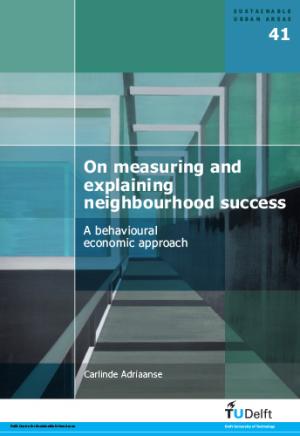Hosted by
On Measuring and Explaining Neighbourhood Success: A Behavioural Economic Approach
Synopsis
This study combines qualitative and quantitative research methods to explain which factors contribute to a problem-free or problematic functioning of neighbourhoods in general and especially of Dutch neighbourhoods that were built in the first years after World War II. An important part of the book is about the development of measuring instruments. Special attention is given to the development of a risk scale that offers researchers and policymakers the opportunity to distinguish on a metric level between problematic and successful neighbourhoods.
This book brings together key insights from Urban Studies and central elements of Behavioural Game Theory. The author applies the notions of strong reciprocity and altruistic punishment in Prisoner’s Dilemmas and Assurance Games to describe and explain the interdependent choices that residents make when they act as producers and maintainers of the social climate in the daily living environment of a problem-free early post-Second World War neighbourhood.

